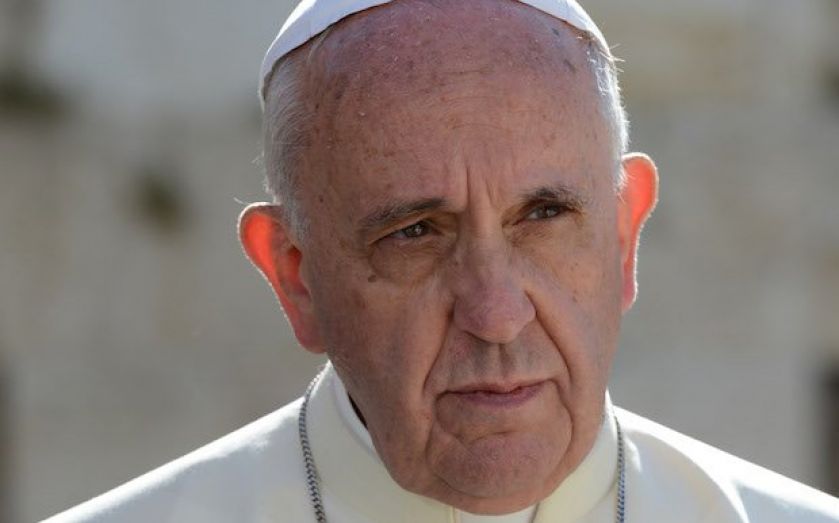Why the Pope is wrong on inequality

Pope Francis visited Seoul, South Korea last Saturday, where he urged wealthy nations to “hear the cry of the poor” and resist the “allure of materialism.” The condemnation of capitalism and inequality has been a common theme for Francis since his papacy began. In his first major work written as Pope, Francis called capitalism “a new tyranny” and urged global leaders to take steps to fight inequality. When meeting with UN Secretary-General Ban Ki-Moon last May, the Pope called for nations to redistribute wealth to address the growing inequality gap.
Last Saturday was more of the same, as Francis focused on inequality, scapegoating world poverty on the wealthy. In South Korea, however, where capitalism has brought freedom and abundance in the shadow of a despotic communist regime in the North, it’s a hard message to sell. Kim Eui-kyun, a 61-year-old Catholic from Seoul, told reporters that "If someone has made a fortune for himself, fair and square, and has a lot of money, I don’t think that’s something to be condemned. I look up to them, actually.” Kim’s attitude reflects those of many South Koreans who have taken pride in their nation’s ability to succeed financially.
The Pope’s warnings reflect a view of inequality that socialists and communists have clung to since the ideology was first conceived by Karl Marx — mainly, that the success of some hurts others economically and that the rich have only gotten rich at the expense of the poor. Since capitalism doesn’t seek equal outcomes, there are winners and losers — some get richer, some get poorer, but the gap between a society’s richest and poorest isn’t a fair gauge of that society’s wealth. While the gap may be larger in wealthier nations, those nations' poor are also considerably wealthier than they were even 10 years ago. Former Prime Minister Margaret Thatcher famously chastised the Left during her ministry for focusing on the equality gap and not actual poverty levels. Socialists, she declared, would be happy if everyone were equally poor.
The inequality gap simply doesn’t matter. Capitalism has produced unrivaled economic growth, drastically lowered world poverty, and increased the life expectancy rates the world over. Capitalism is chiefly responsible for halving of world poverty rates over the past 20 years. Nearly one billion people have been lifted out of poverty by economic growth. Even the UN development report, which uses education and nutrition as yardsticks in addition to income levels, has found world poverty is rapidly shrinking. The report predicts that even the poorest nations could see the end of acute poverty within 20 years. Life expectancy continues to climb as well, already having nearly doubled over the past 200 years.
That’s great news, but it’s a reality many don’t see, including the Pope. Francis hails from Argentina, where the modern political landscape has been shaped by Peronism. Peronism, named for former Argentine President Juan Domingo Perón, is a political movement based on social justice, which advocates state redistribution of wealth. While the Pope has not declared himself a Peronist, his attitudes towards wealth, inequality, and the role of the state in economics clearly demonstrate the influence. Pedro Brieger, one of Argentina’s leading scholars, insists the Pope is influenced by Peronism.
“He was and is close to Peronism because Peronism is a popular movement,” Brieger said. “If you want to be close to the masses, you have to be Peronist.”
It’s a departure for the papacy, as the last two Popes prior to Francis have warned against the power of the state in economic affairs. John Paul II was famously anti-communism, and Benedict XVI, Francis’s predecessor, told Cuba Marxism doesn’t work.
The Vatican is one of the wealthiest institutions in the world. Its true wealth cannot be calculated. Religious institutions like the Vatican are supported by people donating part of their incomes and are thus usually shunned or outlawed in countries where wealth is seen as evil. In Russia, after the Czar Nicholas II was disposed of in 1917, the Bolshevik government established against wealth and free enterprise declared atheism to be the official doctrine of the Soviet Union. Churches, synagogues, and temples were destroyed and Christian persecution became commonplace until the USSR collapse in 1991.
The Pope should realize that nations with freedom; economic, political, and religious, are the nation’s where humanity is thriving. It is in these nations where life is longer and fuller, and where people are free to worship and participate in religions. They are also free to do what they want with their money, whether they choose to spend, invest, or donate it, the choice is theirs, as it was their labor that earned it. Capitalism has nearly eradicated poverty, and any system which alleviates the suffering of the poor should be lauded by Christians.